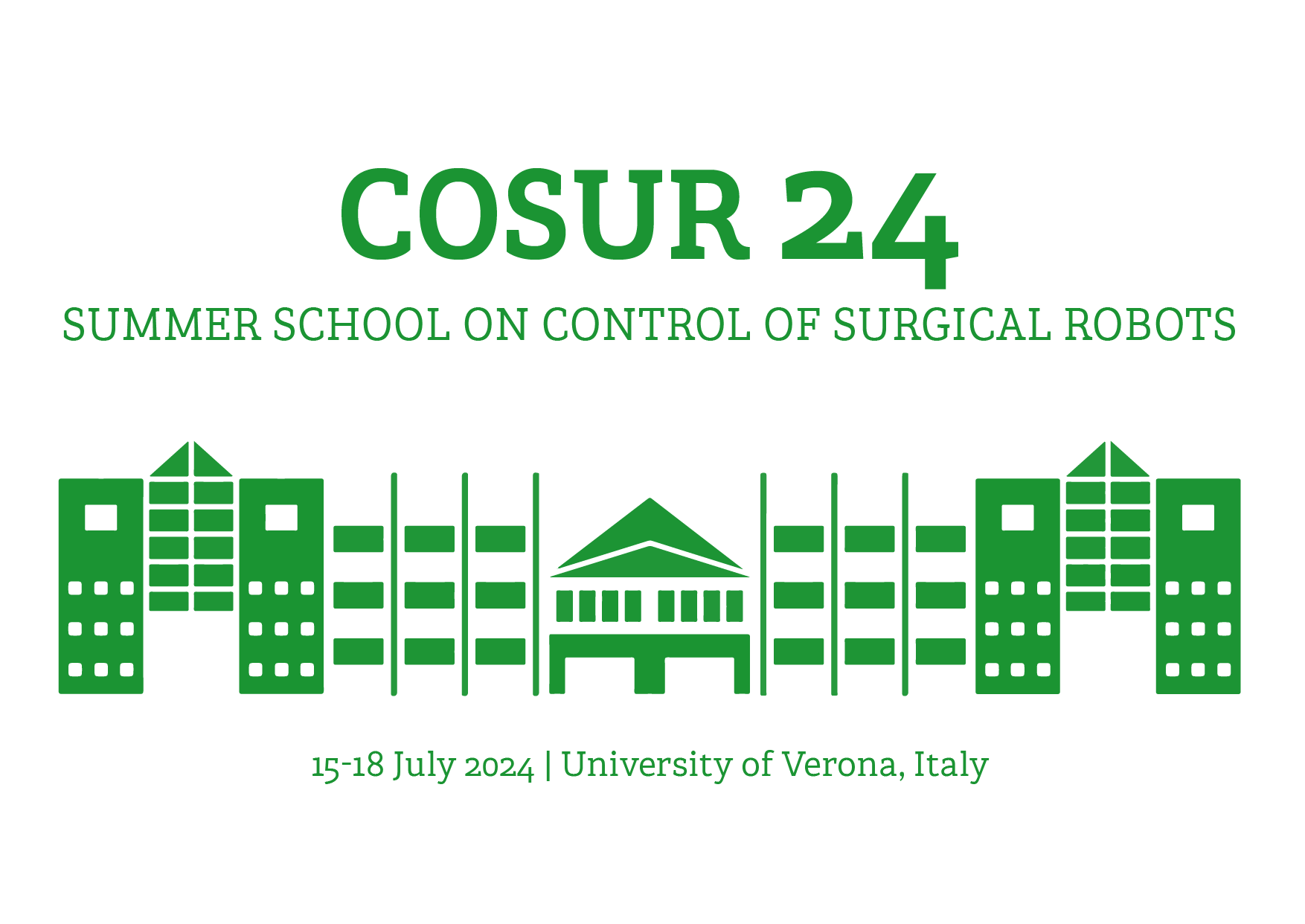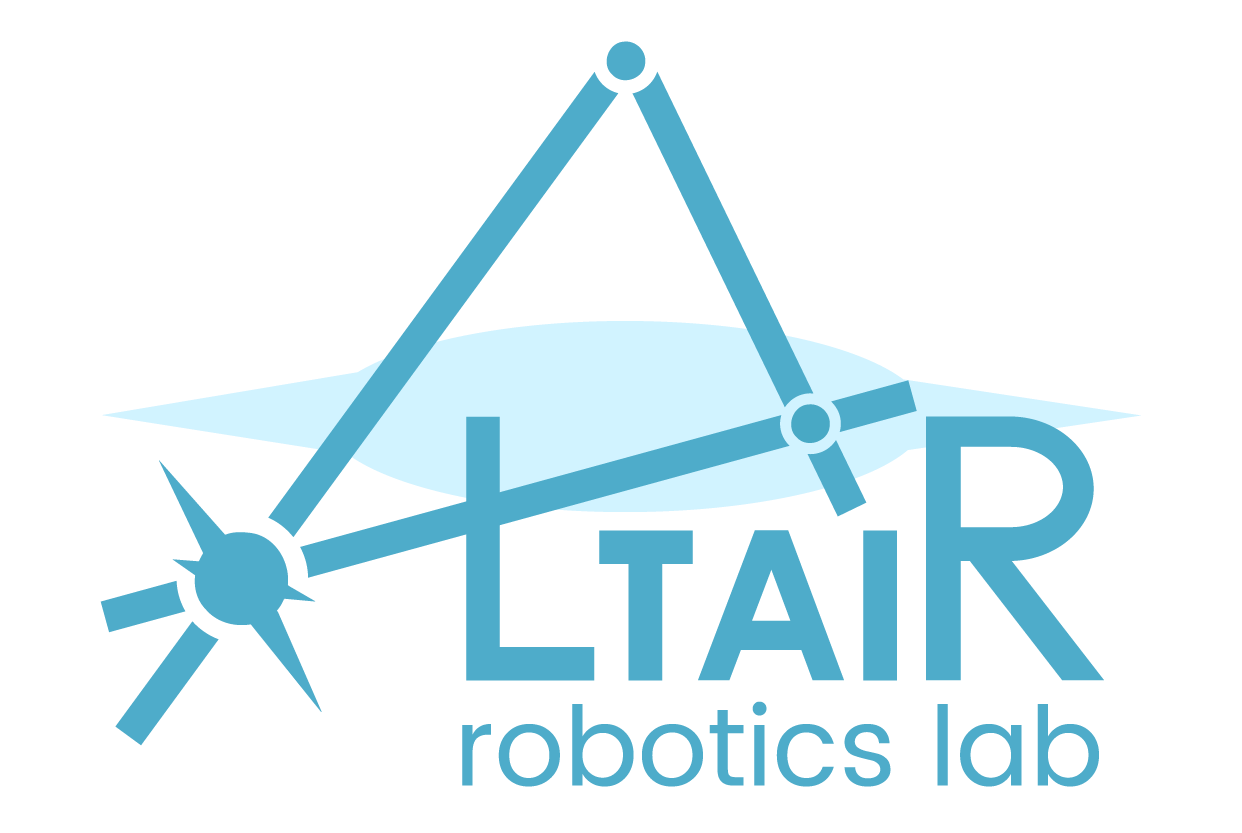Ph.D. summer school
COSUR: SUMMER SCHOOL ON CONTROL OF SURGICAL ROBOTS
dVRK from zero to HERO
15-18 July 2024 – Verona, Strada Le Grazie 15, ITALY
Presentation
JOIN US!

The COSUR summer school targets PhD students interested to the multidisciplinary field of research in robotic surgery. Following the success of previous editions (2016-2018-2022, held in Verona), the 2024 edition aims to bridge the gap between robotic surgery and Artificial Intelligence (AI), providing a roadmap to the next generation of autonomous surgical robotic systems. The school will focus on four main topics:
- CONTROL teleoperation and control algorithms for surgical robots
- SIMULATION surgical simulation and advanced control with reinforcement learning
- SENSORS surgical sensors for advanced perception
- AUTONOMY cognitive architectures for high-level autonomy in robotic surgery
We will delve into these topics with the aid of invited national and international experts from multidisciplinary areas, including surgeons, industrial partners involved in the development of surgical robots, AI and robotic researchers and professors. Moreover, theoretical lectures will be interleaved with hands-on laboratory sessions for a deeper understanding of the main tools and algorithms for the control of surgical robots. The school will then offer a unique opportunity to attendees to increase their knowledge about robotic surgery and establish fruitful research cooperation with leading experts.
We will use the da Vinci Reseach Kit (dVRK) platform as a reference setup since it has become a solid support for surgical robotics research.
Unique topic
In this fourth edition we will offer a deep dive across the most recent advancements in Surgical robotics. We open also the opportunity to present and discuss your late breaking result!
Open to
PhD students and Researchers in relevant fields as robotics, AI, medicine, ethics, laws and natural language processing.
See you there
Theoretical and laboratory sessions will both take place at Verona University. Physical presence is mandatory.
GENERAL INFORMATION
Costs and fees
| Masters and Ph.D. students | 400 € |
| Post-doctoral researcher | 500 € |
| Professionals and others | 700 € |
The fee includes:
- Access to all sessions
- Conference materials
- Coffee breaks and lunches
- Social dinner (on Wednesday 17)
Payment instructions will be sent via email to the selected candidates. To ensure the best possible experience for participants, particularly during the practical sessions, the number of participants admitted will be limited to 40 people.
Late Breaking Results
You will be given an opportunity to present the key highlights of your research, new findings, novel methodologies and innovative solutions in a 3-5 mins teaser pitch presentation. Following the session, there will be an interactive discussion with the speakers focusing on future research directions.
Certification of attendance
At the end of the school it will be possible to get a certification of attendance. The certification can be used by students to obtain the corresponding ECTS from their PhD courses, or to comply to any other requests by their home university.
Accomodation
Due to the Opera week in Verona that overlaps the duration of the summer school, we strongly suggest participants check for accommodation solutions near the University as soon as possible. We offer accommodation at a special fare at the Hotel Indigo in Verona: https://www.indigoverona.com/it/. The hotel offers 20% discount on both single and double rooms, please check the website directly (discount code will be made available soon).
Transportation
To get any information abou the public transporation in Verona please visit https://www.visitverona.it/en/plan/how-will-you-get-around-.
programme and speakers
Last editing: 11 July 2024
15-18 July 2024 at Room Green
Department of Computer Science
Department of Engineering for Innovation Medicine
University of Verona – ITALY
| Monday, July 15th CONTROL | Tuesday, July 16th SIMULATION | Wednesday, July 17th SENSORS | Thursday, July 18th AUTONOMY |
|
|---|---|---|---|---|
| 9.00 - 9:45 | Robotic surgery introduction (Fiorini) | Multi sensory guidance (Mariani) | Shared autonomy (Ficuciello) | Cognition paradigm (Hernansanz) |
| 9.45 - 10.30 | Bilateral teleoperation (Muradore) | Multi sensory guidance (Mariani) | Occlusion robust manipulation (Jones) | Transfer learning (De Momi) |
| 10.30 - 11.00 | Coffee break | Coffee break | Coffee break | Coffee break |
| 11.00 - 12.00 | Teleoperation lab (Piccinelli) | Simulation in surgery (Tagliabue) | Electric Impedance (Dall'Alba) | Late breaking results |
| 12.00 - 14.00 | Lunch break | Lunch break | Lunch break | Lunch break |
| 14.00 - 14.45 | Teleoperation lab (Piccinelli) | RL surgery lab (Scheikl) | Situation awerness lab (Roberti) | Reasoning lab (Meli) |
| 14.45 - 15.30 | Teleoperation lab (Piccinelli) | RL surgery lab (Scheikl) | Situation awerness lab (Roberti) | Reasoning lab (Meli) |
| 15.30 - 16.00 | Coffee break | Coffee break | Coffee break | Coffee break |
| 16.00 - 16.45 | dVRK hardware (Kazanzides) | RL surgery lab (Scheikl) | Situation awerness lab (Roberti) | Reasoning lab (Meli) |
| 16.45 - 17.30 | dVRK software (Deguet) | Surgical perspective (Simone Giacopuzzi) | dVRK results (Gozzi) | Open challenges and farewell |
Confirmed speakers per area
CONTROL
Paolo Fiorini
Altair Robotics Lab – University of Verona
Talk title:
Robotic Surgery in the Past… and to the Future
CONTROL
Riccardo Muradore
Altair Robotics Lab – University of Verona
Talk title:
Fundamentals of teleoperation
SIMULATION
Andrea Mariani
Scuola Superiore Sant’Anna Pisa – SoundSafe Care
Talk title:
Accelerating Surgical Robotics Research – An overview of 10 years with dVRK
Training augmentations in minimally invasive surgery
SIMULATION
Eleonora Tagliabue
Carl Zeiss AG
Talk title:
Patient-specific simulation for autonomous surgery
SIMULATION
Simone Giacopuzzi
University of Verona
Talk title: TBD
SENSORS
Fanny Ficuciello
Università degli Studi di Napoli Federico II
Talk title:
Shared-autonomy in surgical robotics
SENSORS
Diego Dall’Alba
Altair Robotics Lab – University of Verona
Talk title:
Robotic assisted electric bio-impedance sensing
SENSORS
Dominic Jones
Leeds University
Talk title:
Autonomous Manipulation of Soft Tissues in Robot-Assisted Surgery
AUTONOMY
Albert Hernansanz
Pompeu Fabra University
Talk title:
Towards robotic autonomy in robot-assisted surgery: cognition paradigm
AUTONOMY
Elena De Momi
Politecnico di Milano
Talk title:
Towards clinical transfer of surgical autonomy
Laboratory sessions speakers
CONTROL
Nicola Piccinelli
Altair Robotics Lab – University of Verona
Talk title:
Laboratory session on Control
SIMULATION
Paul Scheikl
Friedrich-Alexander-Universität (FAU)
Talk title:
Laboratory session on Simulation
SENSORS
Andrea Roberti
Altair Robotics Lab – University of Verona
Talk title:
Laboratory session on Sensors
AUTONOMY
Daniele Meli
Altair Robotics Lab – University of Verona
Talk title:
Laboratory session on Reasosing
Registration OPEN
Registration
DEADLINE by June 10thMay 17th fill up the registration form to express your interest to attend. Participants can join from anywhere.
Selection
The number of participants is limited in accordance with the group activities.
Reservation
By June 15thMay 31th accepted participants will be notified by email.
Contacts
Location
Room Verde
Department of Computer Science
Department of Engineering for Innovation Medicine
University of Verona (Italy)
Strada le Grazie 15, 37134 Verona
Get directions
Organization and Partners
Nicola Piccinelli – nicola.piccinelli@univr.it
Andrea Roberti – andrea.roberti@univr.it
Daniele Meli – daniele.meli@univr.it
Ameya Pore – ameyaravindra.pore@univr.it
Paul Maria Scheikl – paul.m.scheikl@fau.de
Prof. Riccardo Muradore – riccardo.muradore@univr.it

